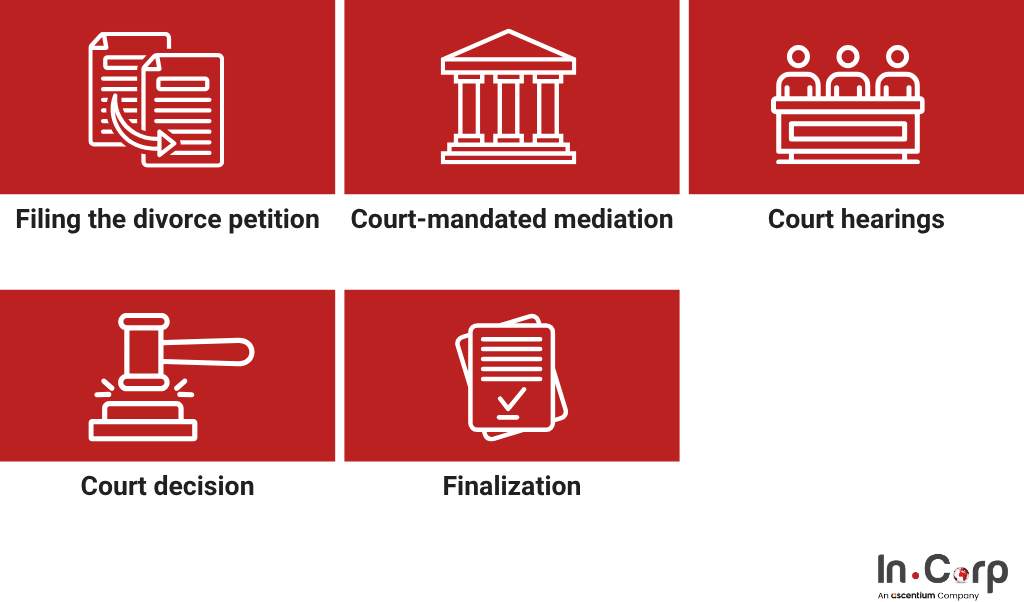Getting a divorce in Indonesia involves navigating a legal process that varies depending on your religion, nationality, and type of marriage. Whether you’re an Indonesian citizen or a foreigner married in Indonesia, understanding the divorce process, legal grounds, and your rights is essential to ensure a lawful and fair separation.
Legal framework for divorce in Indonesia
In Indonesia, divorce is not a private agreement. A court must approve it, and the process varies based on religion. The applicable court and legal procedures depend on how the marriage was registered.
Key laws governing divorce in Indonesia
- Law No. 1 of 1974 on Marriage (Undang-Undang Perkawinan): Applies to all marriages in Indonesia and defines the basic structure of divorce.
- Islamic law (Kompilasi Hukum Islam): Governs divorce for Muslim couples and includes forms such as:
- Thalaq: divorce initiated by the husband
- Khulu’: divorce requested by the wife
- Fasakh: court-annulled divorce for specific reasons
- Indonesian civil code: This code applies to non-Muslim couples. The District Court handles divorces following civil procedures.
Jurisdiction of courts
- Religious Court (Pengadilan Agama): This court handles divorce for Muslim couples and adheres to statutory and Islamic legal principles.
- District Court (Pengadilan Negeri): Handles divorce for non-Muslim couples. Focuses on civil law without religious doctrine.
Read more: What to expect before considering mixed marriages in Indonesia
Grounds for divorce in Indonesia
Courts in Indonesia only grant divorces based on legally valid grounds, which include both general and religion-specific conditions.
Required documents for divorce in Indonesia
To begin the divorce process, you must prepare several key documents, such as:
- Marriage certificate
- National ID (KTP) or passport
- Family Card (Kartu Keluarga)
- Proof of residence
- Documents related to children (if applicable)
Additional paperwork and translations may be required depending on your situation, especially for mixed-nationality marriages or expatriates.
The divorce process in Indonesia: Step by step

All divorces in Indonesia go through the court. Here’s a simplified breakdown:
- Filing the divorce petition: File your divorce case at the appropriate court.
- Court-mandated mediation: The court will attempt to reconcile the couple before proceeding.
- Court hearings: If mediation fails, hearings will be held to present facts and evidence.
- Court decision: The judge will issue a verdict based on the case.
- Finalization: After the decision is binding, official documents are issued.
Each case may vary in length and complexity, depending on factors like mutual consent, presence of children, or contested claims.
Child custody and alimony in Indonesian divorce
When a marriage ends, the court also decides on custody, child support, and property division as part of the divorce process.
Child custody rules
- Children under 12 are usually placed with the mother, unless proven unfit.
- For older children, the court may consider their preference.
- Custody decisions can also be influenced by factors such as:
- Emotional bond with each parent
- Financial capacity to raise the child
- Stability of the living environment
Financial support and property division
- The non-custodial parent typically provides child support.
- Alimony may apply based on financial dependence.
- Joint assets acquired during marriage are divided equally.
- Personal assets (e.g., inheritance, pre-marital property) usually remain separate.
Special considerations for foreigners and mixed marriages
- Divorces involving foreigners or mixed-nationality couples in Indonesia require additional legal steps. Key points include:
- Divorce is possible if the marriage is legally registered in Indonesia and at least one spouse has residency.
- The correct court depends on religion: the Religious Court for Muslims, the District Court for non-Muslims.
- Foreign spouses must provide valid passports, residency permits (KITAS/KITAP), and possibly translated/legalized documents.
- The divorce ruling must also be recognized in the foreign spouse’s home country.
How InCorp can assist with divorce and custody matters
Navigating family law in Indonesia can be complex, especially when custody, assets, or cross-border issues are involved. At InCorp Indonesia (an Ascentium Company), we offer legal consultation services such as:
- Guidance on your legal rights and obligations
- Support with preparing and reviewing essential documents
- Trusted consultation for cases involving mixed-nationality or foreign spouses
Click the button below to secure your legal rights with confidence.
Frequently Asked Questions
Do all divorces in Indonesia go through court?
Yes. Divorce in Indonesia must be approved by a court—Religious Court for Muslims and District Court for non-Muslims.
What are the legal grounds for divorce in Indonesia?
Courts grant divorce only on valid grounds such as infidelity, abandonment, abuse, irreconcilable differences, or religion-specific reasons.
What documents are needed to file for divorce?
You’ll need your marriage certificate, ID or passport, family card, proof of residence, and documents related to children (if any).
How does child custody work in Indonesia?
Children under 12 usually live with the mother unless proven unfit. Older children’s preferences and each parent’s financial stability may also be considered.
Can foreigners get divorced in Indonesia?
Yes. If the marriage is registered in Indonesia and at least one spouse has residency, divorce is possible. Foreign spouses must provide passports, permits, and translated/legalized documents.
Get in touch with us.
What you'll get
A prompt response to your inquiry
Knowledge for doing business from local experts
Ongoing support for your business
Disclaimer
The information is provided by PT. Cekindo Business International (“InCorp Indonesia/ we”) for general purpose only and we make no representations or warranties of any kind.
We do not act as an authorized government or non-government provider for official documents and services, which is issued by the Government of the Republic of Indonesia or its appointed officials. We do not promote any official government document or services of the Government of the Republic of Indonesia, including but not limited to, business identifiers, health and welfare assistance programs and benefits, unclaimed tax rebate, electronic travel visa and authorization, passports in this website.



